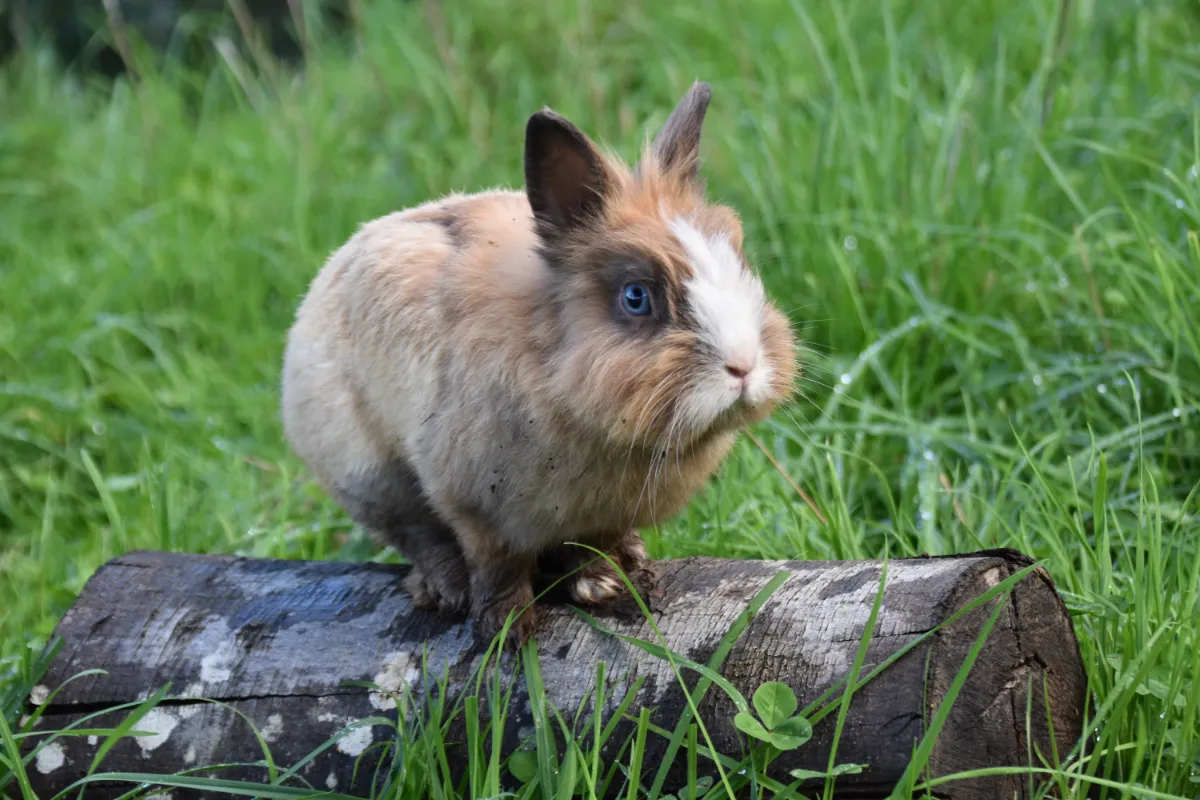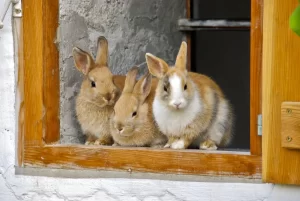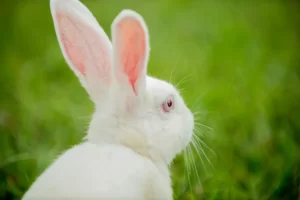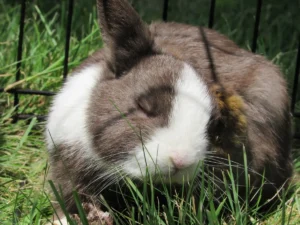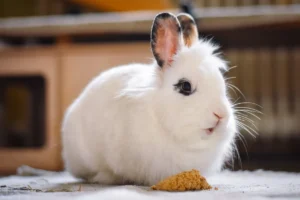Have you ever wondered why your female rabbit is busily constructing a nest? It’s like watching a skilled architect at work! Well, let me enlighten you.
Your furry friend is simply following her natural instincts as she prepares for motherhood. Hormonal triggers prompt her to create a safe and comfortable environment for her upcoming babies.
In this article, we will explore the signs of pregnancy, understand nesting behavior, and provide helpful tips to support your rabbit’s nesting needs. Get ready to become the ultimate rabbit caretaker!
In This Article
- 1 Key Takeaways
- 2 Natural Instincts of Female Rabbits
- 3 Preparing for Motherhood
- 4 Hormonal Triggers for Nest Building
- 5 Creating a Safe and Comfortable Environment
- 6 Signs of Pregnancy in Female Rabbits
- 7 Understanding the Nesting Behavior
- 8 Helpful Tips for Supporting Your Rabbit’s Nesting Needs
- 9 Frequently Asked Questions
- 9.1 What Are Some Common Mistakes to Avoid When Creating a Safe and Comfortable Environment for My Rabbit’s Nest?
- 9.2 How Long Does the Nesting Behavior Typically Last in Female Rabbits?
- 9.3 Can a Female Rabbit Exhibit Nesting Behavior Even if She Is Not Pregnant?
- 9.4 Are There Any Specific Materials I Should Provide for My Rabbit’s Nest to Ensure Her Comfort?
- 9.5 Can I Interfere With My Rabbit’s Nest Building Process to Make It More Convenient for Me?
Key Takeaways
- Female rabbits have a strong nesting instinct driven by hormonal triggers during pregnancy.
- Creating a safe and comfortable environment for nesting is important for the reproductive process.
- Nesting materials such as soft hay, straw, and shredded paper should be provided.
- Nesting behavior can also be a sign of false pregnancy, so it’s important to consult a veterinarian for a proper diagnosis.
Natural Instincts of Female Rabbits
Are you aware of the natural instincts of female rabbits and how they influence their nesting behavior?
It’s fascinating to understand the nesting behavior of wild rabbits and the role hormones play in their nest building.
Female rabbits have a strong instinct to create a safe and comfortable space for their offspring. In the wild, they’ll dig burrows or find hidden spots to build their nests.
This behavior is driven by the hormones produced during pregnancy, particularly progesterone and estrogen. These hormones stimulate the nesting instinct and encourage the female rabbit to gather materials, such as fur and vegetation, to construct a warm and cozy nest.
Preparing for Motherhood
You should start gathering the necessary supplies and creating a comfortable space for your soon-to-arrive offspring to prepare for motherhood. Female rabbits have instinctual nesting habits, and providing them with the right materials is crucial for their comfort and the safety of the babies.
Here are some important steps to take:
- Gather nesting materials: Soft hay, straw, and shredded paper make excellent choices for creating a cozy nest.
- Create a secluded space: Provide your rabbit with a quiet and secure area where she can build her nest undisturbed.
- Offer nesting boxes: These boxes should be spacious enough for the mother to move around comfortably and for the babies to grow.
- Monitor temperature: Keep the nesting area warm, around 65-75 degrees Fahrenheit, to ensure the well-being of the newborns.
- Maintain cleanliness: Regularly clean the nesting area to prevent the buildup of waste and maintain a hygienic environment for the mother and babies.
Hormonal Triggers for Nest Building
When your female rabbit’s hormones are triggered, she will instinctively start building a nest to prepare for motherhood. Hormonal changes in rabbits can cause behavioral and physiological changes, including the urge to create a safe and comfortable space for their soon-to-be-born kits. This nesting behavior is a natural and important part of the reproductive process for rabbits.
To engage the audience, let’s take a look at some common nesting materials that you can provide for your rabbit:
| Material | Description |
|---|---|
| Hay | Provides warmth and comfort for the nest |
| Straw | Offers insulation and cushioning for the kits |
| Soft fabrics | Adds a cozy touch to the nest |
| Shredded paper | Provides nesting material that can be easily manipulated |
Creating a Safe and Comfortable Environment
To ensure the safety and comfort of your rabbit and her nest, provide suitable nesting materials and regularly monitor the environment. Creating a cozy space for your rabbit is essential for her well-being and the health of her babies.
Here are a few tips to help you create the perfect environment:
- Use soft, natural materials such as hay, straw, or shredded paper as nesting materials.
- Place the nest in a quiet, secluded area away from loud noises and disturbances.
- Ensure the temperature is stable and comfortable, between 60-70°F (15-21°C).
- Keep the nesting area clean and free from any potential hazards or toxins.
- Provide plenty of fresh water and a well-balanced diet to support your rabbit’s health and milk production.
Signs of Pregnancy in Female Rabbits
There are several noticeable signs that indicate a female rabbit may be pregnant. One of the most common signs is nesting behavior in non-pregnant female rabbits. If your rabbit starts to gather hay or other soft materials and creates a cozy nest-like area, it could be a sign that she’s preparing for pregnancy. However, it’s important to note that nesting behavior can also occur in non-pregnant rabbits, so it isn’t a definitive sign of pregnancy.
Other signs to look out for include changes in appetite, weight gain, and enlarged mammary glands. It’s essential to be aware that false pregnancy signs in female rabbits can also occur. These signs mimic those of a real pregnancy and can include nesting behavior, territoriality, and aggression.
If you suspect your rabbit may be pregnant, it’s always best to consult with a veterinarian for a proper diagnosis.
Understanding the Nesting Behavior
You should observe your female rabbit’s nesting behavior and determine if it’s a sign of pregnancy or false pregnancy. Here are a few key points to understand nesting behavior in rabbits:
- Nesting behavior in different rabbit breeds varies. Some breeds may exhibit more pronounced nesting behaviors than others.
- Domesticated rabbits tend to display nesting behavior more frequently than wild rabbits. This is because domesticated rabbits are often kept in controlled environments and have a higher chance of reproducing.
- Nesting behavior in rabbits can be a sign of pregnancy. Female rabbits may start gathering materials such as hay, straw, and fur to create a nest for their upcoming litter.
- However, nesting behavior can also occur in non-pregnant rabbits, known as false pregnancy. This can be triggered by hormonal changes or environmental factors.
- It’s important to monitor your rabbit’s nesting behavior and consult with a veterinarian if you suspect pregnancy or have any concerns about your rabbit’s health.
Understanding your rabbit’s nesting behavior can help you provide the necessary care and support during pregnancy or address any potential health issues.
Helpful Tips for Supporting Your Rabbit’s Nesting Needs
Make sure to provide a cozy and safe environment for your rabbit’s nesting needs, and ensure you have plenty of nesting materials such as hay and fur available.
Rabbits have a natural instinct to create nests, just like their wild counterparts. By providing the right materials, you can support this natural behavior and create a comfortable space for your rabbit.
Hay is an essential nesting material as it provides insulation, warmth, and a soft surface for the nest. You can also offer your rabbit fur from a grooming brush or even purchase specialized nesting materials from pet stores.
Frequently Asked Questions
What Are Some Common Mistakes to Avoid When Creating a Safe and Comfortable Environment for My Rabbit’s Nest?
When creating a rabbit’s nest, avoid common mistakes like inadequate bedding and improper nest location. Ensure enough bedding for comfort and warmth, and place the nest in a quiet and secure area.
How Long Does the Nesting Behavior Typically Last in Female Rabbits?
The nesting behavior in female rabbits typically lasts for around two weeks. During this time, your rabbit may become more protective and focused on creating a comfortable space for potential offspring.
Can a Female Rabbit Exhibit Nesting Behavior Even if She Is Not Pregnant?
Female rabbits may exhibit nesting behavior even if they are not pregnant. This behavior is instinctual and can be triggered by hormonal changes. It is their natural way of preparing for potential offspring.
Are There Any Specific Materials I Should Provide for My Rabbit’s Nest to Ensure Her Comfort?
To ensure your rabbit’s comfort, provide nesting materials such as hay, straw, and shredded paper. A nesting box with soft bedding can also be provided. This will create a cozy and secure environment for your rabbit’s nest.
Can I Interfere With My Rabbit’s Nest Building Process to Make It More Convenient for Me?
Interfering with your rabbit’s nest building process may cause stress and disrupt her natural instincts. Instead, provide alternative nesting options, like a cozy hideaway, to make it more convenient for both of you.

